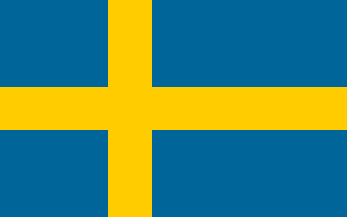|
Swedish |
|
First I'd like to mention Swedish. To someone who isn't Swedish, or lives in Sweden, it might be difficult to explain what is so cool about it. It's a small language, spoken only by about 9 -10 million people. But it's an interesting, and, to some people's ears, beautiful language. I can't tell if Swedish is beautiful or not. If you've heard a language spoken since before you were born, it's hard to think of it in terms of beautiful or ugly. Many people here in Sweden tend to think of Swedish as 'the worst language in the world'. That's not true, but I'm afraid I thought something like that when I was younger. I was convinced that soon Swedish would die out, swallowed up by a flood of anglicisms. What's the point of having different languages if they all sound like English, or rather Anglo?
Swedish is expressive, functional, and just as good as any other language in the world. It might be difficult to learn, but again, I can't tell you how difficult it is. After all, I was born with it.
Swedish might not be spoken on several continents, but it is quite an important langauge on a smaller scale, around the Baltic sea. It's spoken by 9 million people in Sweden and 300 000 in Finland. Apart from that, it's used as a second or third language by the Finnish speaking Finns in Finland, and by many Estonians (that's in Estonia, to the south of Finland).
Have you ever wondered what the difference is between a dialect and a language. Well, one definition I've read is that if you can understand what the other guys are saying (without study), then you're speaking different dialects, and if not, different languages. And since we in Sweden understand the Norwegians (in Norway) and with some effort, the Danes (in Denmark), but not the Icelanders (in Iceland) or the Finns (in Finland), then in fact, we might be speaking different dialects of Nordic. Perhaps East Nordic. What we call Swedish is not entirely made up of Ancient Nordic (which might have sounded a bit like Icelandic). In medieval times, Swedish was heavily influenced by German. In fact, back in those days, people in Iceland, Greenland, the British Isles, all of Scandinavia and at least the northern part of Germany understood each other, a bit like Swedes and Danes can understand each other with a bit of effort. I think that's kind of cool.
With Christianity and the increasing influence of the church, latin became mixed into Swedish (and most likely the same thing happened Norway and Denmark as well).
During the 17 and 18 century, France was a major political power in Europe (though up until the early 1700's, Sweden too, was a political power to be reckoned with, at least in the Baltic area). From France terms connected to science and culture made its way into the Swedish language (and many other European languages).
Finally (well, up until now), during the second half of the 20 century, English began its victorious conquest of the other languages of the world. Of course, as I've already explained, I prefer to call this version of the English language Anglo.
The reason for this is that I don't speak English, and neither do my friends in Lithuania and India. We're not English and we don't live in England. Some people do their best to imitate the English as it's spoken in England or in the US. I prefer not to. I've never spent much time in the UK - never for longer than about two weeks at a time.
Neither do I speak American, as spoken in the US, or Canadian (as spoken by Canadians, at least some of them). Hence Anglo. If you have a better suggestion, please get in touch and let me know. Swedish, along with the other Nordic languages, other Germanic languages (like German, English and Dutch, Romance languages (like French, Italian, Spanish and Portuguese) and even Greek, all belong to the Indo-European language group.
Languages like Finnish, Estonian, Samish (Lap) and Hungarian do not. They belong to the Fenno-Ugrian language group. There are several of these language groups, but I'll only mention one more, just as an example - the Semitic-Hamitic language group (Arabic and Hebrew). |
